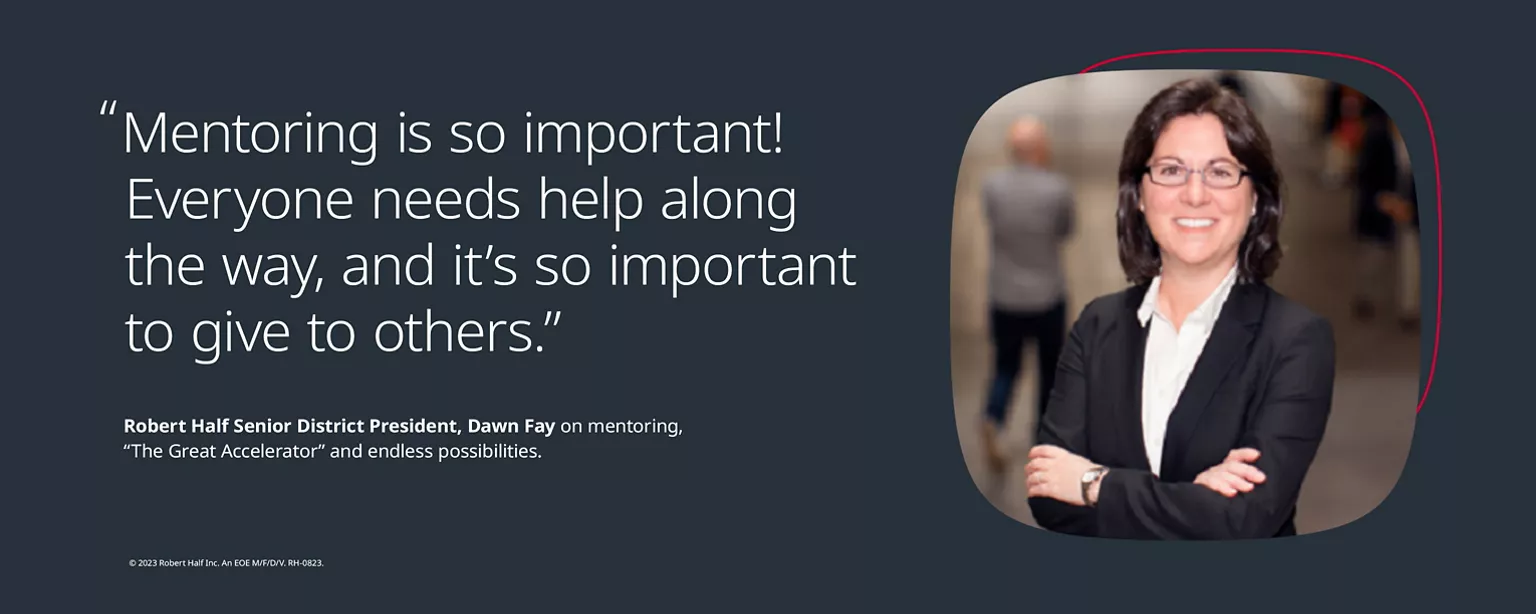Welcome to the latest post in Robert Half’s Thought Leader Q&A series, which features insights from those who have made our company a great place to work and a premier provider of talent solutions.
Dawn Fay started her career as a financial analyst before joining Robert Half as a staffing manager 25 years ago. Since then, she’s worked her way up the career ladder here, holding numerous titles and winning accolades that marked her advancement to a senior leadership role.
Dawn was promoted to operational president in October 2022 from senior district president, and she oversees operations for professional talent solutions. In her new role, Dawn leads Robert Half's permanent and contract finance and accounting and administrative practice groups throughout the central United States and New York Tri-State region.
As a strong proponent of community involvement, Dawn has served as a board member for nonprofit organizations, and as a speaker and guest panelist at events. Here’s what she shared with us in our recent Q&A session.
How has the sudden transformation to remote work in the wake of the pandemic proved beneficial to offices, and what will the workplace of the future look like?
I have said that COVID-19 has been The Great Accelerator. In the few years prior to the outbreak of the pandemic, the workplace had been changing slowly to a more communal space, one where people didn’t have dedicated offices and seats. More team rooms and collaboration space were being added, creating a hoteling system where people could go in and work from a different place each day.
The pandemic has advanced this trend. As more people return to offices, they will likely do so in a more flexible way. Many or most people will work from a distance, either from home or other locations, more than they did before the pandemic; once at the office, even fewer people than before will have a dedicated desk or workspace. This fluidity — essentially, a hybrid work schedule that encourages silo-busting at the office — will allow for greater internal networking and collaboration, which is always beneficial to individuals and organizations.
The accounting profession continues to demonstrate a heightened commitment to diversity. What does the accounting profession need to do to retain and advance more women, in particular?
The accounting profession has come a long way over the past 20-plus years. Most notably, significantly more women are now in the profession. Some statistics say there are more women in accounting than there are men. Even so, women are still underrepresented in senior leadership roles in both public and private accounting.
The key now is to help retain and elevate women in the profession. Organizations should have strong mentoring programs in place and help women employees connect and network internally with sponsors who can help them navigate their careers to get the best training and exposure.
Having internal employee resource groups for women is important and beneficial, as well.
You’ve taken an active mentoring role during your career. What is your mentoring philosophy, and why do you recommend it to others?
Mentoring is so important! Everyone needs help along the way, and it’s so important to give to others. I have also found that the mentor gets just as much out of the experience as the mentee.
When mentoring, it’s important to listen and give advice, and to help make connections for the mentee. Giving your mentee honest feedback is critically important, too. You don’t want to just agree and tell a person what you think they want to hear — that won’t help anyone. Give them honest feedback and push them outside their comfort zone to help them grow.
What advice would you give employees and job seekers to enhance their skill sets and advance their careers?
It’s important to be proactive! Talk to your manager about ways you can get involved with special projects and interact with people outside of your department. Participate in training sessions offered by your company or outside organizations to advance your skills. See if your company offers tuition reimbursement for coursework to advance your knowledge base.
Ask for opportunities to facilitate a meeting or training so you can develop your presentations skills. Along the way, share your career goals and aspirations with your management team so they can help guide you accordingly. Again, be proactive!
If you could have an unlimited supply of one thing, what would it be?
I hope I will always have an endless supply of English muffins! I’ve always enjoyed a toasted English muffin for breakfast, but during the height of the pandemic when nothing was open in NYC, I realized how incredibly diverse and useful these little rounds of sourdough bread are. You can have breakfast, lunch, dinner and snacks with an English muffin. Not only are they great with butter or eggs on them, but try PB&J or tuna fish, or add sauce and cheese and toast them for mini pizzas. The possibilities are endless!
Follow Dawn Fay on LinkedIn.
Meet other Thought Leaders at Robert Half, such as Jamy Sullivan and Stephanie Naznitsky. And be sure to subscribe to the Robert Half newsletter for future installments of our Q&A series and to discover more unique stories, experiences and perspectives on the latest hiring trends.







